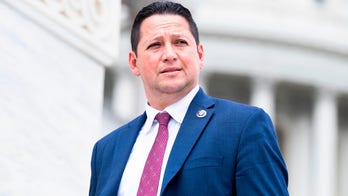Texas abortion law stands: Supreme Court
Alexandria Hoff describes the latest Supreme Court ruling on Texas' abortion law and the continuing legal challenges on 'Special Report.'
The Connecticut House of Representatives passed a bipartisan bill on Tuesday that effectively combats some abortion laws in other states by allowing persons who face legal liability for violating other states' abortion laws to sue for damages in Connecticut courts. Gov. Ned Lamont, a Democrat, pledged to sign the bill if it passes the Democrat-dominated state Senate.
The bill, H.B. 5414, aims "to provide protections for persons receiving and providing reproductive health care services in the state." It creates a legal process by which a person who "has had a judgment entered" against him or her in any state where liability is based on "the alleged provision, receipt, assistance in receipt or provision, material support for, or any theory of… liability… for reproductive health care services that are permitted under the laws of this state… may recover damages from any party that brought the action leading to that judgment."
The bill would protect abortion providers in Connecticut – and those who help them – from liability under the laws of states like Texas when they perform an abortion on a Texas resident who travels to Connecticut for an abortion.

Connecticut Gov. Ned Lamont delivers the State of the State address during opening session at the State Capitol, Wednesday, Feb. 9, 2022, in Hartford, Conn. (AP Photo/Jessica Hill)
The bill comes in the wake of a Texas law that effectively prohibits abortion at around six weeks, when a fetal heartbeat can be detected and before many women know they’re pregnant. Rather than having the state enforce the ban, the Texas law creates a private right of action against individuals who commit or aid and abet an abortion that violates the law – but not against the woman who undergoes the procedure. H.B. 5414 aims to combat such laws in other states, giving those who violate the Texas law a legal defense in Connecticut.
The bill will also allow Connecticut to protect the medical records of women who travel to the state from other states like Texas or Louisiana.
The bill would also allow non-doctors to perform abortions, giving advanced practice registered nurses, physician assistants and nurse-midwives permission to provide medication and aspiration abortions in the first trimester.
After a two-hour debate, the Connecticut House of Representatives passed H.B. 5414, 87-60. Although most Democrats voted for the bill and most Republicans voted against it, 14 Democrats voted against it and seven Republicans supported it, the Hartford Courant reported.
"The culture wars are lapping up across our shores here in Connecticut, and we're standing together," Lamont said Tuesday. "We're making sure that when it comes to our women, when it comes to our choice, when it comes to these cultural wars, we stand on behalf of the women in the state of Connecticut, and that's not gonna change."

Texas Governor Greg Abbott attends a press conference where he signed Senate Bills 2 and 3 at the Capitol on June 8, 2021, in Austin, Texas. (Photo by Montinique Monroe/Getty Images)
Although Connecticut codified the right to abortion in 1990, proponents said laws like H.B. 5414 are necessary to prepare for the U.S. Supreme Court possibly overturning the Roe v. Wade (1973) abortion precedent.
The Family Institute of Connecticut has criticized the legislation, arguing it will create a "safe harbor" for "abortion providers who violate abortion laws in other states."

Joining thousands gathered outside the State Capitol, opponents of a bill to repeal Connecticut's religious exemption for school vaccinations pray outside the Capitol before the State Senate voted on the legislation, Tuesday, April 27, 2021, in Hartford, Conn. (Mark Mirko/Hartford Courant via AP) (Mark Mirko/Hartford Courant via AP)
States with Democratic legislatures have passed laws codifying abortion in case Roe gets overturned. Gov. Jared Polis, D-Colo., signed a law creating a "fundamental right" to abortion and denying any right for the unborn. In 2019, Gov. Andrew Cuomo, D-N.Y., signed a law codifying abortion rights and explicitly removing protections from unborn infants.
CLICK HERE TO GET THE FOX NEWS APP
Meanwhile, states with Republican legislatures have passed laws restricting abortion, with Texas and Idaho passing laws allowing private citizens to file civil suits against individuals who aid or abet abortions after a fetal heartbeat is detected, at about 6 weeks of pregnancy.
While many polls suggest Americans support Roe, in-depth polling reveals a more complicated picture. When asked about their opinion on abortion during specific periods of pregnancy and other situations, 71% of Americans say they support restricting abortion to the first three months of pregnancy (22%), or in other limited circumstances such as rape and incest (28%), to save the life of the mother (9%) or not at all (12%). Only 17% of Americans said abortion should be available during an entire pregnancy and 12% said it should be restricted to the first six months.













































